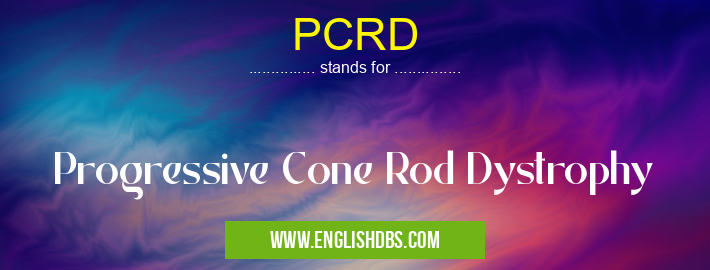What does PCRD mean in DISEASES
PCRD stands for Progressive Cone Rod Dystrophy. It is a rare inherited disease of the eyes that typically begins in childhood or adolescence and progresses slowly over time

PCRD meaning in Diseases in Medical
PCRD mostly used in an acronym Diseases in Category Medical that means Progressive Cone Rod Dystrophy
Shorthand: PCRD,
Full Form: Progressive Cone Rod Dystrophy
For more information of "Progressive Cone Rod Dystrophy", see the section below.
Essential Questions and Answers on Progressive Cone Rod Dystrophy in "MEDICAL»DISEASES"
What is Progressive Cone Rod Dystrophy?
Progressive cone rod dystrophy (PCRD) is a rare genetic eye disorder characterized by progressive vision loss caused by the gradual degeneration of your cones and rods, which are specialized light sensitive cells in the retina of the eye. PCRD can lead to severe vision loss, including total blindness.
Who is at risk for this disorder?
PCRD is an inherited disorder most commonly caused by mutations in the CRX gene. People at risk include those with a family history of PCRD or those who have undergone genetic testing and have been found to be carriers for one of these genes.
What are some common symptoms associated with PCRD?
Common symptoms of Progressive Cone Rod Dystrophy include difficulty seeing in dim light or at night, blurry or hazy vision, colorblindness, extreme sensitivity to light (photophobia), and decreased peripheral (side) vision.
At what age does PCRD typically appear?
The age of onset can range anywhere from early childhood to late adulthood; however many cases tend to start between childhood and young adulthood.
How is PCRD diagnosed?
Diagnosis of Progressive Cone Rod Dystrophy typically involves a comprehensive eye examination that includes visual acuity testing, automated perimetry testing to measure side vision, color vision testing, visual field testing to measure central vision, and funduscopic examination (ophthalmoscopy). Genetic testing may also be required for confirmation and detection of related disorders.
Is there any treatment available for PCRD?
At this time there is no known cure for Progressive Cone Rod Dystrophy; however treatments are available that can slow down its progression and provide relief from some symptoms associated with it. Treatment options include corrective lenses such as eyeglasses or contacts, low-vision aids such as magnifiers or telescopes, dietary modification, medications to reduce inflammation in the eye(s), surgery if necessary, and lifestyle modifications such as avoiding bright lights or wearing sunglasses outdoors.
Is there any way I can prevent my condition from getting worse?
There are steps you can take on your own that may help minimize any further deterioration in your vision due to PCRD; these include quitting smoking if you smoke cigarettes, avoiding bright sunlight/UV rays through sunglasses/sunscreen protection when outdoors during daylight hours as much as possible, eating healthy foods rich in vitamins A & C (such as liver & fruits/vegetables) and omega-3 fatty acids (such as fish/seeds/nuts). Additionally regular follow-up visits with your ophthalmologist will be essential in order to monitor how your eyesight is progressing over time.
Are there any clinical trials currently underway regarding PCRD treatments?
Yes! There are several clinical trials currently underway examining different potential treatment options for people living with progressive cone rod dystrophy; these trials focus on therapies including gene therapy approaches with AAV delivery systems using novel CRX gene sequences and topically applied steroidal nanocapsules to stabilize retinal degradation while maintaining visual function. More information on specific trials & their criteria can be found online through resources such as ClinicalTrials.gov or through registered ophthalmologists in your area who specialize in rare diseases like this one.
What kind of support services are available for me if I live with PCRD?
In addition to finding an ophthalmologist specializing in rare diseases like yours who you trust & feel comfortable working with long term; seeking out emotional & psychological support services tailored specifically around struggles one may face living with a chronic illness like progressive cone rod dystrophy can also be beneficial over time both mentally & spiritually by providing an outlet for expressing difficult emotions stemming from one’s diagnosis while also helping protect against feelings of isolation which unfortunately often come along with it too. Supportive outlets could include joining local support groups online/in-person facilitated by disability rights organizations or applying for grants/scholarships provided by advocacy groups aimed towards helping sufferers afford necessary care etc...
